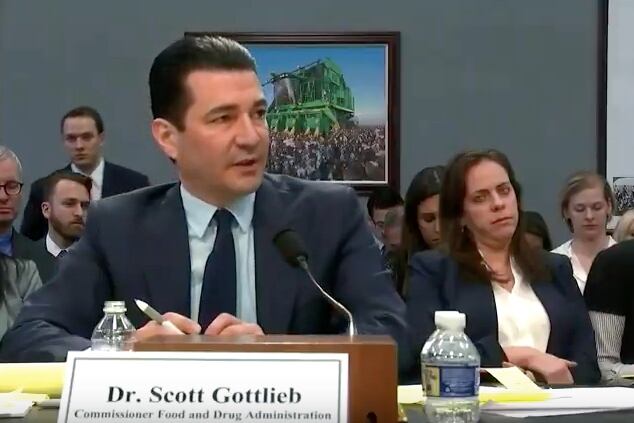Gottlieb signaled the ongoing shift in FDA policy in a speech to a meeting of state agriculture officials on Tuesday as well as testimony before the House Appropriations Committee on Wednesday. The comments are in line with a progressive softening of FDA’s position on the cannabis derivative.
Flood of new products
Products containing CBD have been flooding the market in recent years, first riding on the coattails of state laws that legalized medical marijuana and subsequently full recreational use of the botanical.
And the floodgates are now opening wider with the passage of the most recent iteration of the Farm Bill. That legislation put to rest fears of enforcement from the Drug Enforcement Agency, by removing the plant from DEA’s schedule one list of controlled substances (THC, the narcotic fraction of the plant, is still on the list).
The new legislation has piqued the interest of major multinational companies that reportedly have been inquiring off the record with contract manufacturers about developing new products containing CBD, hemp oil, or full spectrum phytocannabinoid extracts. Many stakeholders believed that that meant that CBD products were good to go; that they had been ‘legalized’ in effect.
Prior drug issue continues to be sticking point
Not so, said Gottlieb. On Dec. 20, 2018, Gottlieb issued a statement in which he reiterated FDA’s authority to regulate CBD as an ingredient (CBD, or cannabidiol, is a non narcotic fraction of cannabis that has been researched for a number of health effects). He also noted that in FDA’s reading of federal law, CBD is not a legal dietary ingredient because it has previously been researched as a drug before promoters started bring CBD-containing supplements to the market. (Epidiolex, a CBD-based antispasmodic drug, was approved by FDA in mid 2018.)
Gottlieb reiterated that position in his speech on Tuesday. At the moment, it is unlawful to introduce food or supplements products into interstate commerce that contained added CBD. The 'added CBD' phrase could be seen as significant, as some stakeholders have observed that full spectrum extracts currently have more regulatory cover than do products that feature isolated, concentrated CBD.
New regulation possible
But Gottlieb also said the agency has the power to make special exceptions for certain ingredients.
“As such, for CBD to be legally marketed as an ingredient in a food or dietary supplement, the law requires that the FDA first would need to issue a regulation to permit such marketing,” he said.
“We’re planning to seek broad public input on this pathway, including information on the science and safety behind CBD. But we know that this process could take time,” Gottlieb said. “So we’re also interested in hearing from stakeholders and talking to Congress on possible alternative approaches to make sure that we have an appropriately efficient and predictable regulatory framework for regulating CBD products,” Gottlieb said.
Gottlieb: We got the message on CBD
On Wednesday, Gottlieb testified before the House Appropriations Committee. He said the agency is aware of the intent of Congress on CBD when the current Farm Bill was put into its final form.
“We heard Congress loud and clear with respect to that legislation,” Gottlieb said in response to a question from Rep. Mark Pocan, D-WI. “I understand Congress wants there to be a pathway for CBD to be available.”
Rule making procedure might be too protracted
Gottlieb he could ‘speculate’ on a possible future framework in which CBD could exist as a high concentration, high purity pharmaceutical form while at the same time be a dietary ingredient for supplements at lower concentrations. But he said the issue is complicated enough that a rule making procedure might last longer than Congress saw fit (more than two to three years), so new legislation on CBD might be necessary.
“This is not a straightforward process. There is not a good proxy for us doing this through regulation, and if we get comments back and find this is sufficiently complicated for the agency, we will come back and have a conversation with Congress on with how we might be able to work together on this,” Gottlieb said.
New approach welcomed by industry
Attorney Marc Ullman, of counsel with the firm Rivkin Radler, has represented several companies on the CBD issue. He said the new approach is welcome, but cautions that the industry also needs some sort of certainty in the meantime.
"Any movement by FDA to clarify what it really expects from the CBD trade would be a hugely positive step. Right now we have statements from Senior Management at FDA stating that CBD is not a legal ingredient in food or supplements, yet doing nothing to enforce that position in the absence of outrageous drug claims. This has created a confused marketplace, with companies being placed in the unfortunate position of being forced to choose between compliance and responding to consumer demand for an ingredient FDA has repeatedly declared illegal and then turn a blind eye when confronted with straight forward marketing of the same ingredient," Ullman said.
"A rulemaking, with notice and public comment would certainly seem appropriate, though it would be a lengthy process. I believe that input from GW Pharma (which has researched the drugs Epidiolex and Sativex) would likely play a critical role in any final decision. While this process is underway, it is imperative that FDA clearly state its view of the legal status of CBD, publicly state if it is adopting a posture of enforcement discretion and what the parameters of that discretion would be, and then actually follow up as we have a right to expect a regulator to do," he added.


